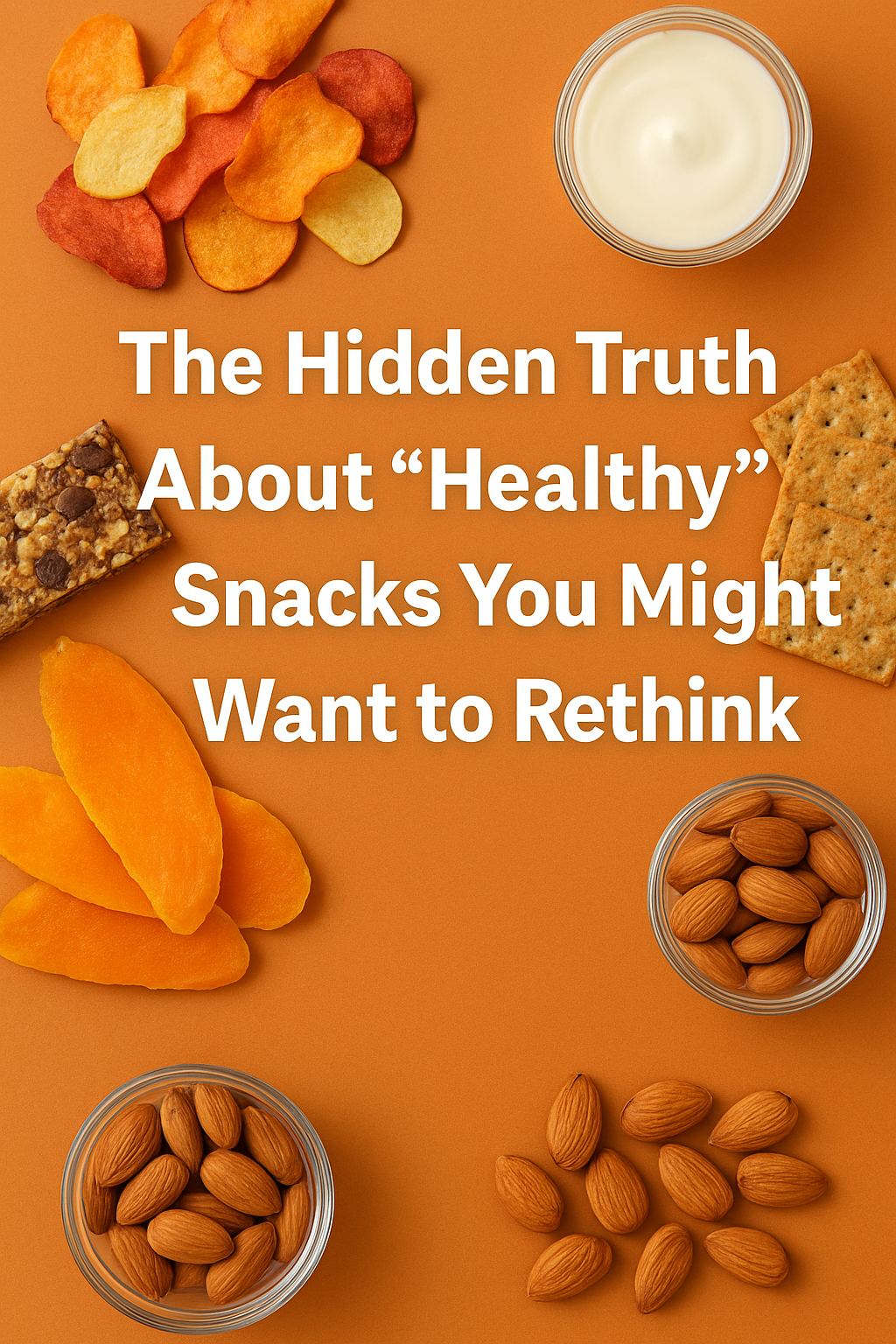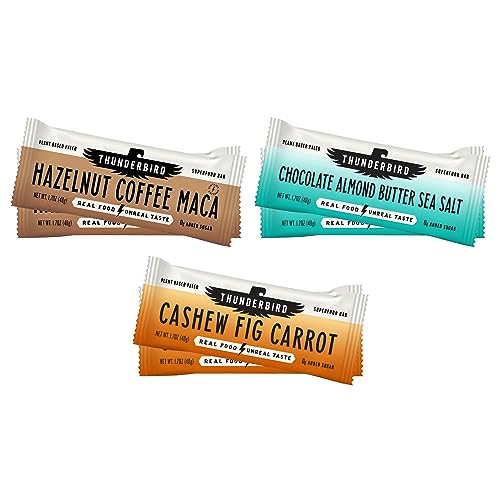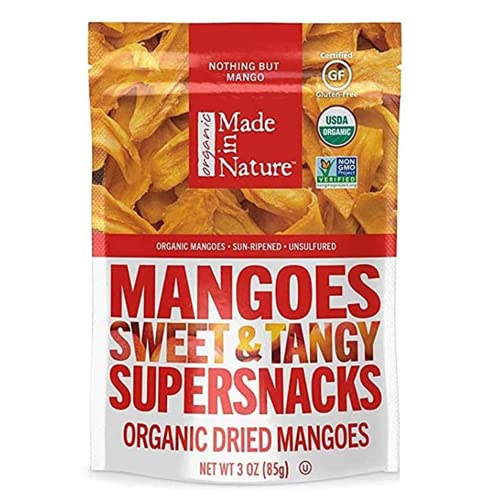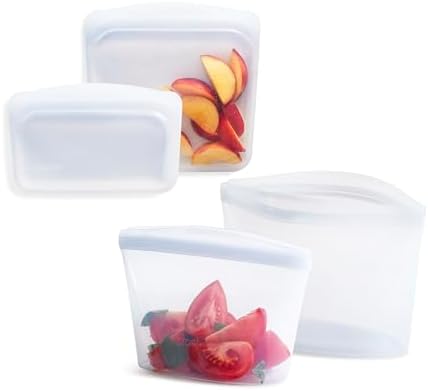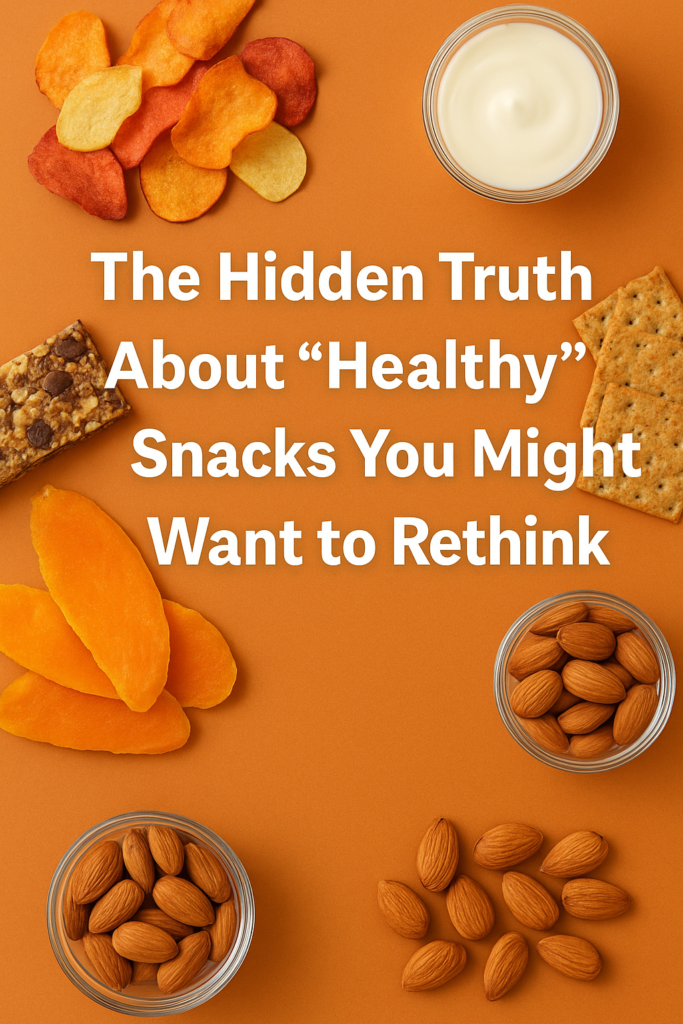
In today’s fast-paced world, healthy snacks have become a go-to solution for busy individuals trying to maintain a nutritious diet on the go.
Supermarkets are lined with neatly packaged bars, chips, and drinks all proudly labeled as “natural,” “low-fat,” or “packed with superfoods.”
But here’s the hidden truth: not all healthy snacks are as good for you as they seem.
In this post, we’ll dig deep into why some “healthy” snacks may actually sabotage your health goals—and what better options you should consider instead.
🚨 The Problem With So-Called Healthy Snacks
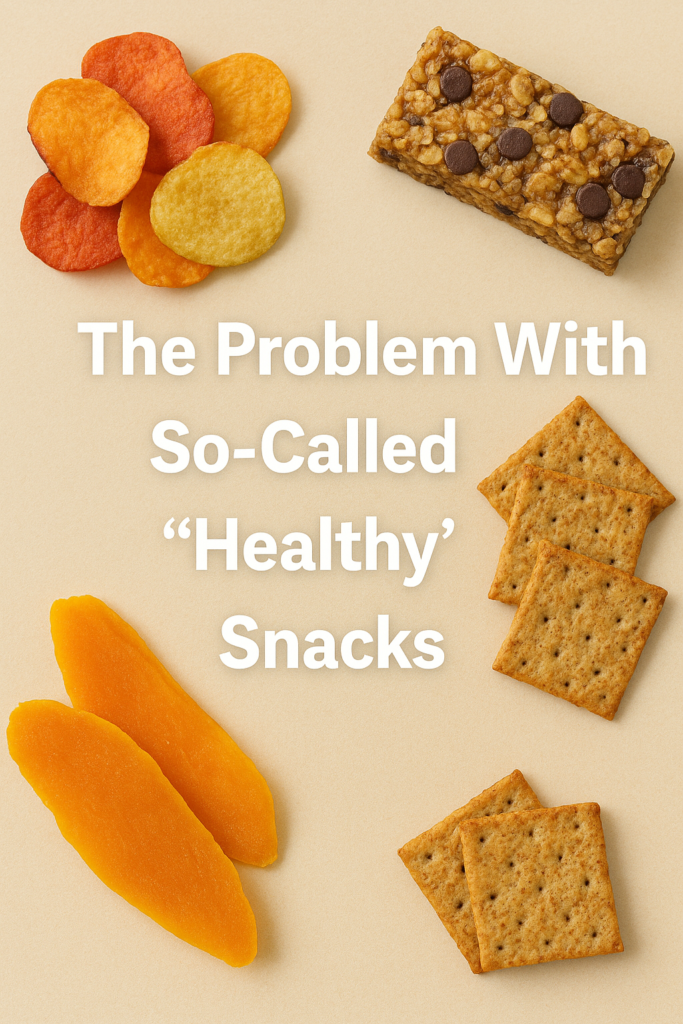
It’s easy to believe that anything labeled “healthy” must be a smart choice.
However, many healthy snacks are nothing more than processed foods in disguise.
Packaging terms like “natural,” “organic,” or “low-fat” can create a false sense of security around snacks that are actually loaded with sugars, chemicals, or empty calories.
According to a report from the Centers for Science in the Public Interest (CSPI), packaging claims are often more about marketing than about real nutrition1.
Let’s dig into the biggest issues you should watch out for when it comes to supposedly healthy snacks.
1. Hidden Sugars Lurking Everywhere
Sugar is sneaky and hides in foods that seem innocent at first glance.
Many popular snack bars, yogurts, and “healthy” energy bites are packed with added sugars under names like brown rice syrup, agave nectar, malt syrup, or fruit juice concentrate.
Even when marketed as “organic” or “natural,” these sugars still cause blood sugar spikes and crashes.
Research from the Harvard T.H. Chan School of Public Health shows that frequent consumption of added sugars can lead to weight gain and insulin resistance2.
If you’re relying on healthy snacks daily, hidden sugars could be quietly sabotaging your goals.
🔎 Smarter Choice: Choose dried fruits without added sugar, like Made in Nature Organic Dried Fruit Variety Pack. These satisfy sweet cravings without artificial sugars and offer fiber for better digestion.
2. Ultra-Processed Ingredients
The term “natural ingredients” doesn’t always mean minimal processing.
Many so-called healthy snacks include refined oils, chemical preservatives, and artificial flavors.
Studies, such as one published in The BMJ, confirm that a high intake of ultra-processed foods is linked to higher risks of heart disease3.
Common red flags in ingredient lists include soy protein isolates, hydrogenated oils, and chemical sweeteners like sucralose or aspartame.
Ultra-processing strips snacks of their fiber, antioxidants, and real nutrients, making them calorie-dense and nutritionally poor.
🔎 Smarter Choice: Reach for whole-food snacks with minimal ingredients, such as Thunderbird Real Food Bars Variety Pack. They are crafted with dates, nuts, seeds, and spices—no added junk.
3. Misleading Portion Sizes
Portion distortion is a massive problem with packaged healthy snacks.
A single small-looking bag can often contain two or three servings.
What seems like a 150-calorie snack can easily turn into a 450-calorie indulgence if you’re not careful.
According to the FDA, misunderstanding serving sizes is a major contributor to overeating and hidden calorie intake4.
The damage adds up fast when you assume one package equals one serving.
🔎 Smarter Choice: Pre-portion your snacks using tools like Stasher Reusable Silicone Snack Bags. These eco-friendly pouches make it easy to control portions without relying on packaging gimmicks.
4. Excessive Sodium Content
Many savory healthy snacks sneak in more sodium than you realize.
Products like veggie chips, baked crisps, and protein crackers often carry high sodium loads despite looking lighter than traditional chips.
Even “lightly salted” options can push you over the recommended daily limit quickly.
According to the American Heart Association, high sodium intake raises your risk of hypertension and heart disease5.
Without checking the sodium content carefully, you could turn a healthy habit into a health hazard.
🔎 Smarter Choice: Choose naturally low-sodium snack options like NOW Foods Raw Unsalted Almonds. They deliver heart-healthy fats, protein, and fiber without unnecessary salt.
5. False “Organic” and “Natural” Health Halos
Buzzwords like “organic,” “natural,” and “non-GMO” create a health halo around many snacks.
This halo effect makes consumers believe the product is automatically nutritious and low in calories, which is often far from the truth.
An analysis by the Organic Consumers Association revealed that organic products can still be loaded with sugar, unhealthy fats, and preservatives6.
The organic label simply refers to how ingredients were grown, not the overall nutritional profile.
It’s critical to read the full nutrition label and ingredient list, not just the marketing buzzwords.
🔎 Smarter Choice: If you’re looking for organic snacks that are actually good for you, try Go Raw Organic Sprouted Pumpkin Seeds. They offer protein, magnesium, and iron, with zero added sugars or oils.
🛒 Smarter Snack Upgrades: Quick Picks
| Problematic Snack | Better Alternative Product |
|---|---|
| Sugary Snack Bars | Thunderbird Real Food Bars Variety Pack |
| Hidden Sugar Dried Fruit | Made in Nature Organic Dried Fruit Variety Pack |
| Portion Distortion Bags | Stasher Reusable Silicone Snack Bags |
| High-Sodium Chips | NOW Foods Raw Unsalted Almonds |
| Fake-Healthy Organic Snacks | Go Raw Organic Sprouted Pumpkin Seeds |
🍫 Hidden Sugars in “Healthy” Snacks
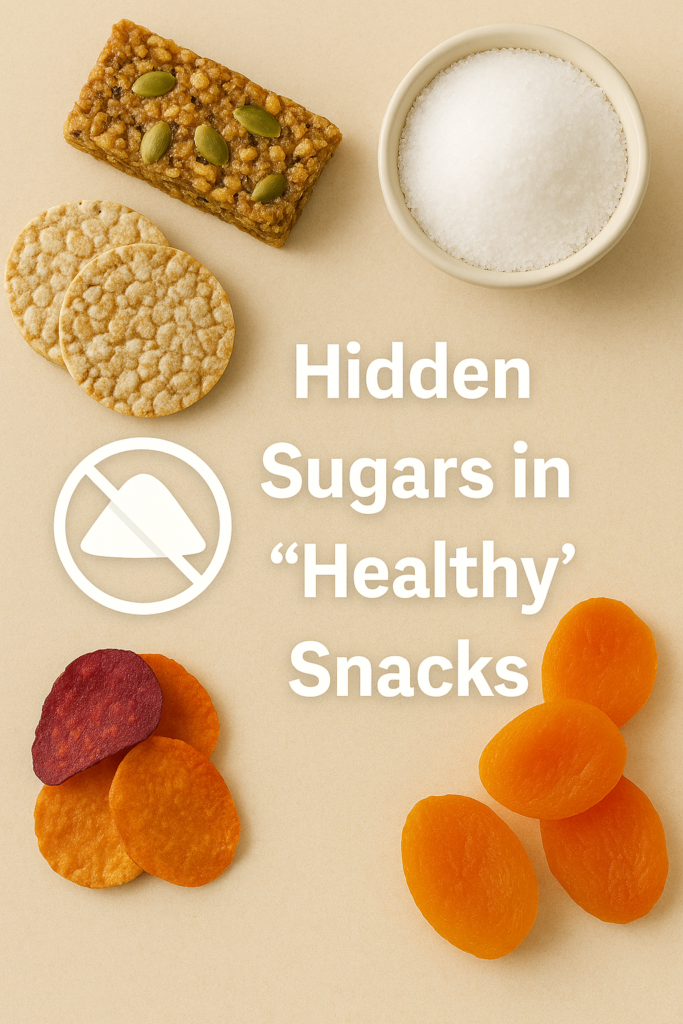
When you think of healthy snacks, sugar is probably the last thing that comes to mind.
However, hidden sugars are one of the biggest problems lurking in foods marketed as healthy.
Even foods labeled as “natural,” “organic,” or “low-fat” can be packed with surprising amounts of added sugars.
According to the Harvard T.H. Chan School of Public Health, many processed snacks aimed at health-conscious consumers contain just as much added sugar as traditional candy bars1.
Understanding where hidden sugars hide—and how they affect your body—is critical if you want your healthy snacks to truly support your wellness goals.
1. Sneaky Sugar Names to Watch Out For
Food companies rarely list “sugar” plainly on the ingredient label.
Instead, they disguise it under dozens of different names.
Common hidden sugar names include:
- Brown rice syrup
- Agave nectar
- Coconut sugar
- Fruit juice concentrate
- Maltodextrin
- Evaporated cane juice
These sweeteners may sound healthier than plain white sugar, but they behave similarly in the body, rapidly spiking blood glucose levels.
The American Heart Association recommends limiting added sugar intake to no more than 25 grams per day for women and 36 grams for men2.
Yet a single “healthy” snack bar can contain 15–20 grams of sugar—nearly a full day’s allowance.
🔎 Smarter Choice:
Choose snacks sweetened only with real, whole fruits.
👉 A great option: That’s It. Apple + Fruit Bars Variety Pack — made with just two ingredients: real fruit and nothing else.
2. Fruit Sugar vs. Added Sugar: Not the Same Thing
It’s important to distinguish between naturally occurring sugars and added sugars.
Whole fruits contain natural sugars paired with fiber, vitamins, and minerals.
This fiber slows down digestion, preventing blood sugar spikes and promoting satiety.
Added sugars, on the other hand, are stripped of fiber and nutrients, causing rapid blood sugar surges.
This distinction matters greatly when choosing healthy snacks.
According to a review published in Nutrients Journal (2020), diets high in added sugars—but not natural fruit sugars—are linked to obesity, heart disease, and diabetes3.
🔎 Smarter Choice:
Pick snacks that focus on whole, dried fruits without added sweeteners.
👉 Recommended: Made in Nature Organic Dried Mangoes — organic mango slices with no added sugar, preservatives, or sulfur.
3. Hidden Sugar Traps in “Protein” and “Energy” Bars
Protein bars and energy bites are often perceived as healthy, quick sources of nutrition.
However, many of these bars contain as much sugar as a dessert.
Some popular protein bars have between 15–30 grams of sugar—more than a chocolate bar.
Ingredients like dates and figs in moderation are acceptable, but if they are heavily processed with syrups and concentrates, they lose their health edge.
A 2021 study in Frontiers in Nutrition found that overconsumption of highly processed “high-protein” snacks was associated with increased cravings and reduced satiety4.
🔎 Smarter Choice:
Choose simple-ingredient, naturally sweetened bars without hidden syrups.
👉 Ideal pick: RXBAR Protein Bar Variety Pack — sweetened only with dates and packed with egg whites, nuts, and real foods.
4. Yogurts and Smoothies: Sugar Bombs in Disguise
Low-fat yogurts and ready-to-drink smoothies are heavily marketed as healthy snacks.
Yet a closer look at their labels often reveals high sugar content—sometimes 20–40 grams per serving.
Even those labeled “natural” or “organic” may contain added sugars to compensate for the loss of flavor when fat is removed.
According to Harvard Health Publishing, smoothies and flavored yogurts are major contributors to excessive hidden sugar intake among adults and teens5.
A better strategy is to start with plain products and add your own flavorings naturally.
🔎 Smarter Choice:
Opt for plain Greek yogurt and blend your own smoothies at home.
👉 Highly recommended: FAGE Total 5% Plain Greek Yogurt — rich, creamy, naturally low in sugar, and packed with protein.
👉 For smoothie making, try the NutriBullet Pro High-Speed Blender — easy to use for quick, nutrient-dense blends without added sugars.
🛒 Quick Picks: Real Healthy Snack Alternatives Without Hidden Sugar
| Problematic Snack | Smarter Option |
|---|---|
| Sugary Snack Bars | That’s It. Apple + Fruit Bars Variety Pack |
| Sweetened Dried Fruits | Made in Nature Organic Dried Mangoes |
| Candy-Like Protein Bars | RXBAR Protein Bar Variety Pack |
| Sugar-Laden Yogurt | FAGE Total 5% Plain Greek Yogurt |
| Pre-Made Smoothies | NutriBullet Pro High-Speed Blender |
🥔 Are Veggie Chips Really Healthy Snacks?
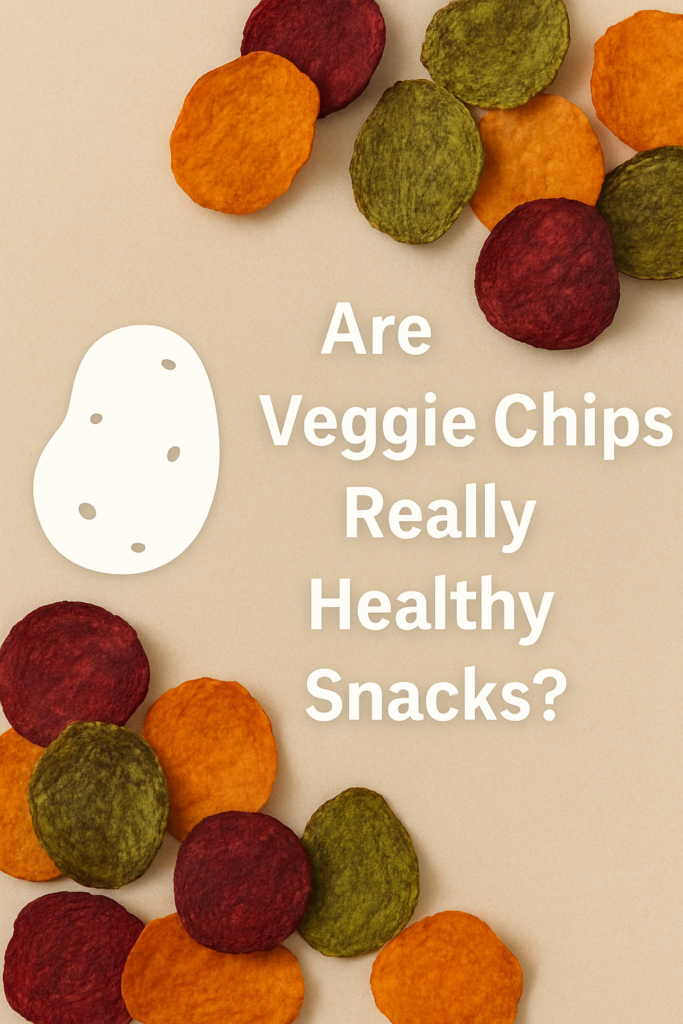
Veggie chips sound like an amazing idea—crunchy, colorful, and “made from vegetables.” However, most veggie chips are:
- Deep-fried like regular potato chips
- Stripped of fiber and nutrients
- Coated with sodium and artificial flavors
According to a report from the Centers for Disease Control and Prevention (CDC), excess sodium intake is linked to hypertension and heart disease3.
🔎 Better Swap: Instead of reaching for those bagged veggie impostors, try real freeze-dried vegetable crisps with minimal processing.
👉 Try the [Crispy Freeze-Dried Veggie Bites] made only with 100% whole vegetables—no oils or additives.
🥛 The Truth About Low-Fat and Diet Yogurts
Low-fat yogurts are often seen as the ultimate healthy snack. Unfortunately, when manufacturers remove fat, they often replace it with sugar to make the yogurt taste better.
The American Heart Association warns that excessive sugar intake—even from seemingly healthy sources—can increase the risk of heart disease4.
🔎 Better Swap: Opt for plain Greek yogurt with live cultures and no added sugar. Then, sweeten naturally with fresh berries or a drizzle of raw honey.
👉 Stock up on a [Plain Greek Yogurt Multipack] that’s high in protein and low in sugar for the perfect midday snack.
🥣 Protein Bars: A Double-Edged Sword
Protein bars are convenient healthy snacks, especially for gym-goers and busy professionals. But many brands pack their bars with:
- Artificial sweeteners
- Processed soy proteins
- Preservatives
- Excess calories
According to research published in the Journal of the American College of Nutrition, not all protein sources are created equal. Some processed forms can trigger inflammation5.
🔎 Better Swap: Choose clean protein bars with a short ingredient list. Look for real food ingredients like dates, nuts, and grass-fed protein.
👉 Great option: [Real-Food Protein Bar Sampler], crafted with whole ingredients you can recognize.
🍿 Watch Out for “Skinny” Popcorn and Baked Snacks
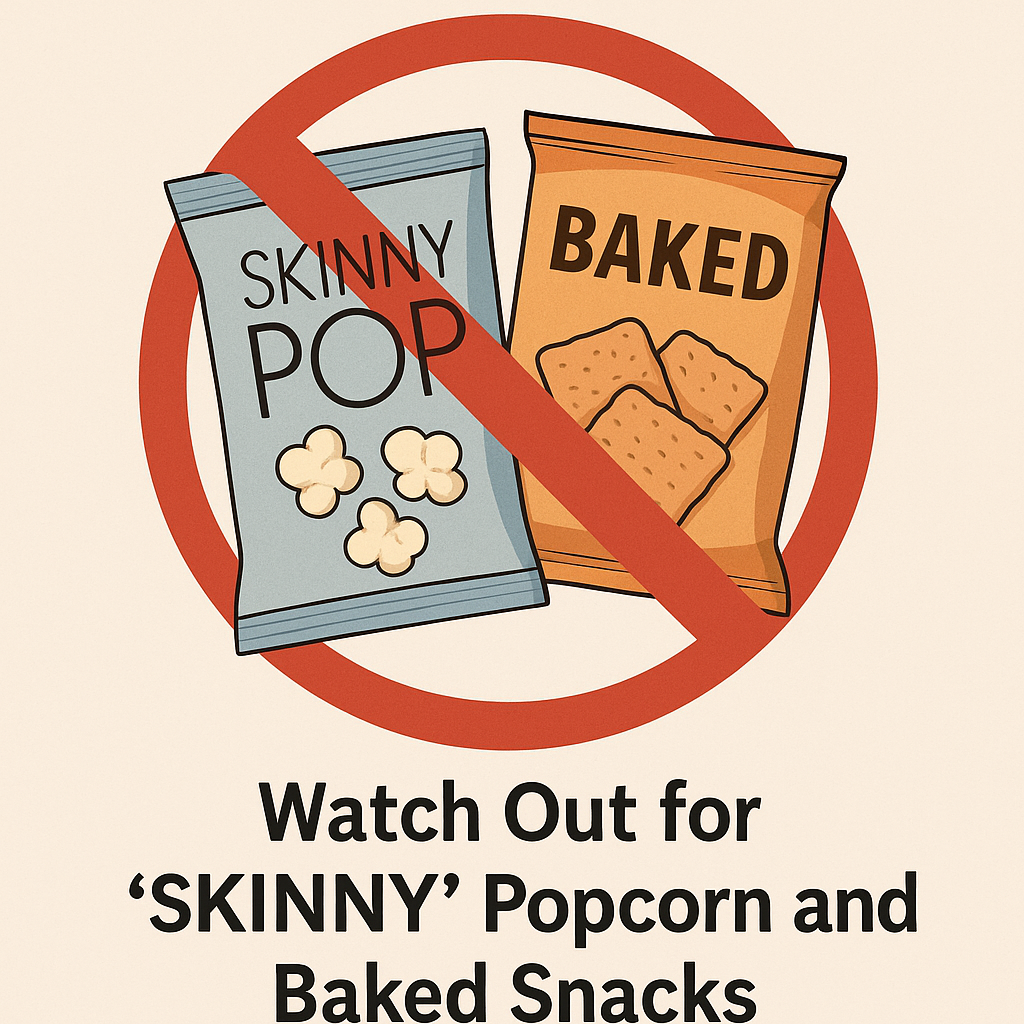
Popcorn and baked chips are often marketed as lighter healthy snacks, but don’t be fooled:
- Flavored popcorn can be drenched in artificial butter and salt.
- Baked chips often still have refined carbs and additives.
A study from Public Health Nutrition shows that portion sizes and hidden fats still make these snacks a problem for weight management6.
🔎 Better Swap: Air-pop your own popcorn and season it naturally.
👉 Grab a [Compact Air Popper Machine] and enjoy fresh, low-calorie popcorn seasoned with herbs like rosemary or turmeric.
✅ How to Choose Truly Healthy Snacks
When shopping for truly healthy snacks, keep these tips in mind:
- Read the Ingredient List: The shorter, the better.
- Watch Serving Sizes: Even “healthy” foods can add up quickly.
- Prioritize Whole Foods: Choose snacks made from real ingredients like nuts, seeds, fruits, and vegetables.
- Limit Added Sugars: Check the sugar content and recognize sneaky sugar substitutes.
- Focus on Fiber and Protein: They help keep you full and satisfied longer.
Pro Tip: Always carry emergency healthy snacks like nut butter packets, homemade energy bites, or fresh fruit to avoid impulse buys at convenience stores.
🛒 Smart Shopping List for Real Healthy Snacks
Building a pantry filled with real, nourishing healthy snacks is one of the best strategies for staying on track with your health goals.
When you have the right options within reach, it becomes much easier to make smart choices even on your busiest days.
Let’s break down a foolproof shopping list for truly clean, satisfying healthy snacks—and where to find the best picks.
1. Nuts and Seeds: Nature’s Perfect Snack
Nuts and seeds are some of the most nutrient-dense healthy snacks you can choose.
They are packed with healthy fats, plant-based protein, fiber, vitamins, and minerals.
Choosing raw or dry-roasted varieties without added sugars or oils is key.
Research from the American Journal of Clinical Nutrition shows that regular nut consumption supports heart health, weight management, and even longevity1.
🔎 Smart Pick:
Stock up on NOW Foods Raw Unsalted Almonds — pure almonds with no salt, oils, or additives, perfect for clean snacking anytime.
2. Dried Fruits: Naturally Sweet and Satisfying
Dried fruits can be fantastic healthy snacks if you choose varieties without added sugar or preservatives.
Look for options labeled “unsweetened” or “no sugar added” to avoid hidden calories.
Dried fruits provide concentrated sources of fiber, antioxidants, and vitamins.
According to Nutrients Journal, moderate dried fruit consumption is associated with better diet quality and reduced risk of chronic diseases2.
🔎 Smart Pick:
Go for Made in Nature Organic Dried Fruit Variety Pack — a mix of figs, apricots, and mangoes with no added sugars or sulfur.
3. Clean Protein Bars: Simple and Honest Ingredients
Protein bars can be a convenient source of on-the-go energy if chosen wisely.
Avoid bars with long ingredient lists filled with syrups, artificial sweeteners, and isolated soy proteins.
Focus on bars made with real foods like nuts, dates, seeds, and clean proteins.
A review in Frontiers in Nutrition emphasizes that minimally processed protein snacks improve satiety and nutrient absorption compared to highly processed ones3.
🔎 Smart Pick:
Keep a box of RXBAR Protein Bar Variety Pack — they’re made with just a handful of ingredients you can pronounce, and naturally sweetened with dates.
4. Yogurt: Choose Plain and Powerful
Yogurt is an incredible source of probiotics, calcium, and protein—but only when you skip the flavored varieties.
Flavored yogurts often sneak in as much sugar as a dessert.
Plain Greek yogurt offers a much better alternative for a real healthy snack.
According to Harvard Health Publishing, choosing plain Greek yogurt can enhance gut health, support immunity, and improve digestion4.
🔎 Smart Pick:
Reach for FAGE Total 5% Plain Greek Yogurt — creamy, rich, and naturally low in sugar without any added junk.
5. Popcorn: The Ultimate High-Fiber Crunch
Popcorn can be one of the healthiest whole-grain snacks—if prepared the right way.
Skip the butter-drenched, microwave varieties full of additives.
Instead, air-pop your own popcorn and season it lightly for a truly healthy treat.
Popcorn is high in fiber and can help keep you full between meals, according to Nutrition Reviews5.
🔎 Smart Pick:
Make it easy with the Presto PopLite Hot Air Popper — a fast, oil-free way to enjoy fresh popcorn at home with no added preservatives.
6. Veggie Snacks: Choose Whole, Not Fried
Veggie chips often trick consumers into thinking they’re getting a healthy serving of vegetables.
Most are heavily fried and low in actual vegetable content.
Instead, seek out freeze-dried or dehydrated veggies that maintain most of their nutrients.
A study in the Journal of Food Science confirms that freeze-drying preserves more antioxidants and vitamins compared to frying or baking6.
🔎 Smart Pick:
Try Brothers All Natural Freeze-Dried Fruit and Veggie Crisps — light, crispy, and made with real produce, with no additives.
🛒 Real Healthy Snack Essentials: Quick Shopping List
| Snack Type | Smarter Product Link |
|---|---|
| Nuts & Seeds | NOW Foods Raw Unsalted Almonds |
| Dried Fruits | Made in Nature Organic Dried Fruit Variety Pack |
| Clean Protein Bars | RXBAR Protein Bar Variety Pack |
| Plain Yogurt | FAGE Total 5% Plain Greek Yogurt |
| Air-Popped Popcorn Maker | Presto PopLite Hot Air Popper |
| Freeze-Dried Veggies | Brothers All Natural Veggie Crisps |
Build a Pantry That Works for You
Stocking up on real healthy snacks isn’t about chasing the newest trends—it’s about choosing foods made from simple, whole ingredients.
With a well-stocked pantry full of smart choices, you’ll never have to worry about reaching for a processed, sugar-loaded snack again.
Investing in high-quality snacks today means investing in your energy, focus, mood, and long-term health.
Start curating your smarter snack station today—your future self will thank you!
🧠 Final Thoughts: Stay Smart About Healthy Snacks
Not all healthy snacks deserve a place in your pantry. Many are cleverly marketed processed foods designed to appeal to health-conscious consumers without delivering true nutrition.
By being label-savvy, choosing whole-food-based options, and keeping a few trusted snacks on hand, you can actually enjoy snacking without guilt—and without compromising your health.
Start making smarter choices today—your body will thank you later.
Would you like me to also create Pinterest Pins and social media captions optimized for this blog post to boost your traffic? 🚀
(They would pair perfectly to maximize visibility!)
📚 References
- Nutrients Journal: Nutritional Quality of Packaged Foods Marketed to Children (2019)
(For the issue of hidden sugars and misleading “healthy” marketing.) - Harvard Health Publishing: What You Should Know About Health Claims on Food Packages (2021)
(For understanding health halos on snack packaging.) - Centers for Disease Control and Prevention (CDC): Sodium and Your Health (2020)
(For the risks of high sodium content in snacks.) - American Heart Association: Added Sugars Recommendations (2022)
(For daily sugar limit guidelines.) - The BMJ: Ultra-processed Food Consumption and Risk of Cardiovascular Disease (2020)
(For dangers of ultra-processed foods.) - Frontiers in Nutrition: Effects of Processed Protein Consumption on Satiety and Health (2021)
(For how processed protein snacks impact cravings and fullness.) - Nutrition Reviews: Popcorn as a Healthful Snack (2015)
(For the benefits of air-popped popcorn.)
Related Articles:
These Viral Cauliflower Recipes Deserve the Hype—Here’s Why
As an Amazon Associate, I earn from qualifying purchases.

